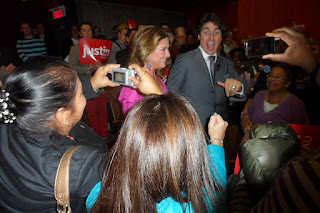Because I also had to organize a workshop about the legacy of war and occupation in Vietnam, I decided to combine that workshop with a presentation of other touchstones of Vietnamese culture including its geography, legends, history, culture and food.
I began to prepare for my cultural night over a month ago. I must thank my uncle Truong and aunt My Lien, friends whom I recently met in Montreal, for helping me with planning what food to prepare for the evening. After a discussion with them, we decided our menu would feature food from the three regions of Vietnam: the North, the Middle and the South. The menu included: Nem (Spring Rolls), Bánh Cuốn (Winter Rolls), Gỏi Cuốn (Summer Rolls), Xôi Đậu Xanh (Sticky Rice and Green Bean); deserts were tropical fruits, coconut candy, banana candy and coconut juice. Yummy!!!
We went to the oriental market...
There we bought a lots of stuff. Though there were only four main dishes we were buying for, we had to buy so many little things to make them taste just right.
Aunt My Lien is the big chef,
making Nem
Uncle Truong assisted sometimes when he had the time...
The final product was delicious:
NEM (Pork, mushroom, onion,...)
Preparation for making Gỏi Cuốn (Summer Rolls)
After a month being BUSY with the preparation, it was time to present:
Introducing participants
I began by inviting my guests in Montreal to experience Vietnam, traveling from the North to the South, by tasting the foods from the different regions:
I then invited my guests to get on a special air plane (the "special air plane" which I mention was a series of interesting video clips :) ), to take a trip through 4000 years of Vietnamese history.
I began when the Viet people were created and the country established. According to the Legend, the Vietnamese are the descendants of the Dragon Lac Long Quan and the Fairy Au Co. I presented the story of this Legend and our first 3000 years of history by showing this video clip:
Vietnamese legend and history
I began when the Viet people were created and the country established. According to the Legend, the Vietnamese are the descendants of the Dragon Lac Long Quan and the Fairy Au Co. I presented the story of this Legend and our first 3000 years of history by showing this video clip:
Vietnamese legend and history
I then described how the Viet people have fought time and again against powerful foreign invaders. Watching other videos that outlined our storied resilience, I highlighted the many victories of the Vietnamese people against invasion and occupation. During this first 3000 years of Vietnamese history, our people fought in order to save the Vietnamese land and people in a number of invasions. This instilled a tradition of resistance to foreign domination that is said to have prepared the Viet people to fight against many powerful military intrusions that occured in modern times.
For example in 1858, French colonialists invaded Vietnam starting eighty years of exploitation and oppression of the Vietnamese. There were many revolts and uprisings, but most failed. The uprising became successful only when Ho Chi Minh (our national hero!) recognized the potential of Communism to unify the people.
In 1954, the Vietnamese totally defeated the French colonialist at the Dien Bien Phu battle .
The war did not stop there. As the fear of communism spread throughout the whole Asia, American Imperialists invaded Vietnam. The Vietnamese had to keep fighting another 30 years for freedom and independence.
One of the consequences of the American Vietnam war was/is the many victims of Agent Orange. Agent Organce is a very powerful herbicide that was used in the war by the American army in order to destroy forests where Vietnamese soldiers were thought to be hiding. When it is released, some dioxins are also generated. Dioxins can cause cancer and lead to genetic modifications. Decades later after the war, dioxins still lurk in Vietnamese soil, causing deformities which are passed on from generation to generation.
Finally, I introduced to my guests some important elements of Vietnamese culture.
Đàn Bầu- Vietnamese traditional musical instrument
A few months before coming to Canada, I met with Nguyen Thanh Tung who is a famous Vietnamese monochord music performer and composer. He is well-known not only for his moving monochord performances and compositions, but also for his inner strength and perseverance as a blind Agent Orange victim. Thanh Tung has performed Vietnamese traditional music and masterpieces by Beethoven, Chopin, etc., in many countries and received worldwide notice.
Nguyen Thanh Tung
The talent and perseverance of Tung Nguyen has inspired me to learn Đàn Bầu. I decided to play a tune for my guests.
In this video, Tung Nguyen performs "You Raised Me Up" by Đàn Bầu.
Vietnamese Traditional Dress - Áo Dài
I also introduced to my guests the Vietnamese traditional dress - Áo Dài - using a short video clip showing the history of Áo Dài.
The Vietnamese cultural night was a great success! I'm so thankful to the Sauvé Scholar Foundation for giving me this opportunity to introduce to my friends in Montreal some important parts of my country and history.
I would like to thank everyone for coming to learn about Vietnam. I would also like to thank uncle Truong, aunt My Lien and my fellow scholars for helping me with organizing this event.
You made the night wonderful!!























